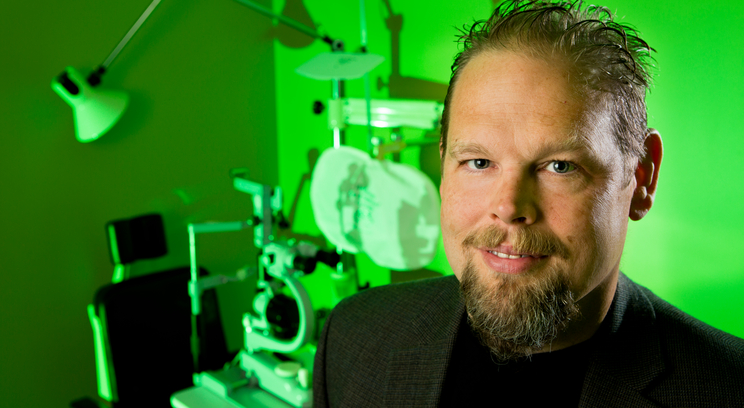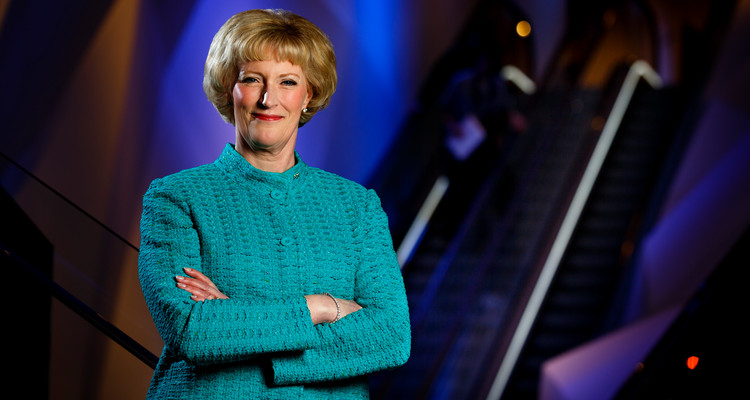“If you want to change the world, you have to start at the beginning,” said Jerad Justesen ’02 M.B.A.
He founded the Mills Health Clinic in Minnetonka with his wife, Kacey Justesen, M.D., a family physician. The free suburban clinic is a sign of shifting demographics and the changing landscape of American health care.
For the Mills Health Clinic, the beginning was the fall of 2011. Like any entrepreneur, Jerad Justesen saw an unmet need in the market and sought to fill it. The clinic was conceived in conversations with members of The Mills Church and the Intercongregation Communities Association (ICA) Food Shelf. “Many of our neighbors were facing economic realities that made basic needs such as food, housing and health care perilously insecure,” Justesen explained.
“The unmet challenge,” according to clinic publications, “was seeing neighbors who were pressed to forgo basic health care either because of a loss or lack of medical insurance, being underinsured, or unable to afford high deductibles and co-pays. We believe that the suburbs contain people that need help.”
Besides the anecdotal evidence at the church and food shelf, data proved the need. According to the Metropolitan Policy Program at Brookings, the poor population in America’s suburbs has grown faster than anywhere else in the country for decades. During the 2000s, the number of poor living in the suburbs grew by 64 percent – more than twice the growth rate in cities. Today, more poor people live in the suburbs than in America’s big cities or rural areas. Suburbia is home to almost 16.4 million of the poor, compared to 13.4 million in big cities and 7.3 million in rural areas. Locally, 2011 census estimates showed approximately 111,000 uninsured residents in Hennepin County.
A board of directors was formed, and Justesen took the role of executive director. “We set this up as a way to serve people,” Justesen said. “Our job was to mirror God’s love and unconditionally give love to the people that we serve. While doing so, we want to maintain their dignity and build them up as people.”
Transforming a Former Mill House Into a Clinic
Justesen took on the responsibilities of planning, fundraising, networking – and demolition. The Mills Church donated an old, single-family home on its property. It was one of the original mill houses for the former Minnetonka Mills across the street.
“The house itself was really not in good shape,” Justesen said. “Pretty much all that was standing of this house were the outside walls. I did a lot of the demolition and as I would take the stucco off the walls, there were no boards – it was just mush.”
“We had to raise the funds to get the house turned into a clinic,” Justesen said. He connected with Sandcon, a Plymouth-based design, build and remodel company that took on the project pro bono. With its help, in the fall of 2012 the one-time home was turned into a 1,000-square-foot clinic with three exam rooms, an office and a lobby.
“We visited other free clinics and one of the things we found is that we had to maintain the dignity of the patients. Clients should be able to come here and get the same level of service anyone else would get at their doctor’s office; in fact, better. We wanted this to look just like a normal clinic. And I think we pulled it off. One of the comments we get from people walking through is, ‘I would come here.’ Success!”
Networking at its Best
After the renovations were complete, new challenges arose. “Networking was huge. We’re new and we’re tiny,” Justesen said. “So one of our challenges was to get people to believe in us. It’s tougher to trust someone who’s small, who you don’t have a relationship with, who you don’t know, who’s new.”
Through networking, he acquired equipment and arranged partnerships for services such as pharmacy and radiology that the clinic can’t provide onsite. Hope for the City and Northwest Family Physicians donated equipment. The Family Medicine Cares USA Grant from the American Academy of Family Physicians Foundation provided $8,800 for the purchase of tangible items such as exam tables, electronic health record systems and medical equipment.
Justesen also secured partnerships with Park Nicollet Pharmacy for free prescription medications, Minneapolis Radiology for diagnostic imaging, LensCrafters and Vision Smith for eye care and Union Gospel Mission for dental care. The ICA Food Shelf, Sojourners Women’s Shelter and the Mills Church provide referrals.
“Our goal was to have complete care,” Justesen said. “So the patient comes in, they get seen. If they need a prescription, we can actually send them to Park Nicollet Pharmacy to get their prescriptions filled for free. That’s a level of care that is complete.”
The clinic opened its doors to patients in March. “We did a soft opening so we could get staff trained and get the clinic up and running,” Justesen said. The clinic now sees 12 to 16 patients over two evenings each week for family practice and OB/GYN care. It is open an additional two days each month for optometry.
The clinic has a network of local doctors and other volunteers who provide staff time. Volunteers in Medicine, a national nonprofit, provides staff support and guidance. “We’re open in the evenings now because that’s when we can get volunteers to come in and work. One of our biggest challenges is finding enough providers to be open the days that we want to be open. Our biggest need now is getting the volunteers here,” Justesen said.
Turning Theory Into Practice
Justesen has been applying much of what he learned in his M.B.A. program in getting the clinic started. The planning and organizational skills he developed on campus are helping him to keep it running smoothly.
“Knowing my strengths and limitations is one of the things I really appreciated from my M.B.A. program – figuring out what I’m good at and what I’m not good at, and then minimizing weaknesses and maximizing strengths. Then the networking partnership piece comes in because I can find people who are good at things I’m not.”
Justesen took several courses in entrepreneurship during his studies at St. Thomas. “The difference in being an entrepreneur from this standpoint,” Justesen said, “is that the risk is a lot lower because I’m not trying to make money; the only thing I could really lose is a job I don’t get paid for. The commitment to my donors is that I act as a fiduciary for their money.”
To Justesen, the reward is greater than any financial return “because you really have an ability to change people’s lives dramatically, right away.”
A Shifting Landscape
Over the next decade, the Affordable Care Act (ACA) is expected to extend coverage to 25 million Americans, according to the most recent government estimates. Still, that will leave a projected 31 million people without insurance. According to 2011 estimates from the Minnesota Department of Health, 9.1 percent of Minnesotans were uninsured.
“This is a great state to live in for health care, but there are gaps,” said Justesen, and he doesn’t think they will all be filled as the insurance expansion takes effect in January. He believes there will still be a need for free health care clinics. Even with the ACA, not everyone will be served.
“Our job as a clinic isn’t just to deliver care on this level; our job is to know the resources out there so that we can send patients to them,” Justesen said.
He is familiarizing himself with the new state and federal programs to make sure that he is acting as a liaison on behalf of the clinic’s clients to help them receive services. He sees new tensions coming down the line.
The ACA is “going to put a stress on the health care system that I think we’re underrecognizing,” Justesen said. “There is such a shortage of family health care doctors that when the ACA kicks in, I think people will be surprised at how long it takes to see a physician. You just can’t offer millions more people health care, throw them into a system that’s already taxed and expect that the lines are going to be the same.”
He doesn’t have any easy answers but said The Mills Health Clinic is their way of trying to affect the health care system in America. “It’s easy to complain about things and say ‘I don’t like this because it doesn’t work,’ but how are you trying to fix it?” he asked. “The only way we can continue our success in America is not to bring the successful down, but the unsuccessful up.”
True Happiness
“I think we’re providing the best level of care possible here,” Justesen said. Feedback from patients, providers and donors suggests that they did it right. “What’s surprising to me is how many people want to be a part of it,” he said. “I’m blown away by people’s generosity. I know the clinic is a success and I love being able to provide something to people that changes their lives.”
One patient at a time, the Mills Health Clinic is changing lives. In July, the clinic saw its 100th patient. “That’s 100 opportunities we have had to improve the health and well-being in our community,” Justesen said. “We’re seeing people who haven’t seen a doctor in years. You wouldn’t believe how excited they get. This is a huge thing for them. We’ve already saved people’s lives by diagnosing underlying medical conditions.”
“It has taken me 44 years, but true happiness comes not from focusing on yourself, but from helping others,” Justesen said. “This clinic has proven that.”
Read more from B. Magazine.







